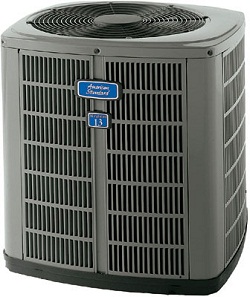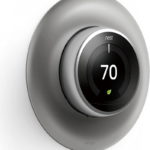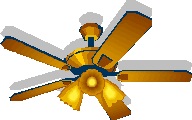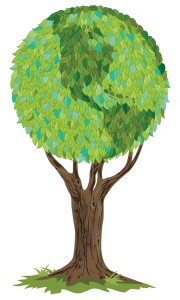To Reduce Your Energy Bill
 On an average summer day, American air conditioners provide enough chilly air to produce 16 trillion ice cubes.
On an average summer day, American air conditioners provide enough chilly air to produce 16 trillion ice cubes.
Air conditioners became widely available in the 1950s.
Today, half of all American homes have an air conditioner. It may be more comfortable for homeowners, but it’s not good for the planet. During summer air conditioners use an ever-increasing amount of electricity.
Energy Facts:
● To cool your home down effectively, the air conditioner needs to be cool itself. So, keep it shaded. An air conditioner exposed to direct sunlight will use up to 5% more energy than a shaded one.
● Air conditioners located on the north side of houses use less energy than those on the south or west side, where it’s sunnier. (Mid-afternoon and early evening sun)
● If your air conditioner receives the afternoon sun, you could build a simple wooden shade screen for it. But make sure you do not block the air flow.
Simple Ways to Save Energy:
 ● If you’ve got central air conditioning: Don’t close your inside house vents. Closing vents reduces it from operating efficiently. Instead, partially close vents to rooms not used. Whenever possible, leave the room door partly open to keep the system operating efficiently. Closing vents puts a strain on the system which reduces the life span of your unit.
● If you’ve got central air conditioning: Don’t close your inside house vents. Closing vents reduces it from operating efficiently. Instead, partially close vents to rooms not used. Whenever possible, leave the room door partly open to keep the system operating efficiently. Closing vents puts a strain on the system which reduces the life span of your unit.
● Turn the air conditioner off when you leave the house for several hours or more.
● Thermostat do not switch your air conditioner to a colder setting when you turn it on. It won’t cool the house any faster, it will waste energy when you forget to turn it back up.
● Put a timer on your thermostat or use a programmable one. You don’t need to leave your air conditioner on all day. Program your thermostat to kick on your air conditioning before you get home. You’ll notice the difference in your bill.
● Keep the heat out, by minimizing the amount of heat entering your home from outside by closing shades and/or curtains on hot days. Sunlight coming in through your glass windows can account for 20% of your air conditioning bill. Also, window film is a wonderful way to block the heat. Don’t leave windows or exterior doors open when the air conditioner is running.
● Thermostat setting recommended setting for a thermostat air conditioner is 78° F.
Caring for Coils:
Coils won’t work efficiently unless the fins that cover the coils are clean and straight. Check them every spring.
● If the fins are bent, you can straighten them with a plastic spatula, or call a professional repair person.
● If the fins are dusty, dirty, or clogged with leaves, you can vacuum them out, or use a blower to blow the dirt and leaves away.
Don’t Forget the Filter
Air conditioners are equipped with filters to protect their fan blades, motors, and other internal parts.
Replace or clean dirty filters. Dirty filters are the N° 1 cause of air conditioner service calls. The recommendation is, replace your filter once a month during the summer. There are permanent washable air filters that are available. Check first with a qualified professional or the unit manufacturer for recommendations. Some permanent filters restrict airflow.
House Fans
There is definite practicality about house fans.
Energy Facts
● Ceiling fans consume as little energy as a 60-watt bulb which is about 98% less energy than most central air conditioners use.
● Ceiling fans are often used instead of air conditioning. But it’s not necessarily one or the other. Fans produce air currents that carry heat away from the skin, so even air-conditioned rooms feel cooler when one is running.
Simple Ways to Save Energy
 ● If you’re shopping for a ceiling fan: Purchase an ENERGY STAR-rated unit. Look for a fan that’s reversible and has more than one speed. Check to make sure that the blades are angled at least 10°.
● If you’re shopping for a ceiling fan: Purchase an ENERGY STAR-rated unit. Look for a fan that’s reversible and has more than one speed. Check to make sure that the blades are angled at least 10°.
● If you’re thinking about installing one: Rooms with the highest ceilings are the best candidates. But make sure the blades are between seven and nine feet above the floor.
● Match the fan to the room. For rooms 12 feet by 12 feet or less, you can use a 36 or 42-inch fan. For rooms up to 12 feet by 18 feet, use a 48- or 52-inch fan. For bigger rooms, you may need more fans.
Plant a Tree
 What can you do that will help cool your house in summer, help block cold winds in winter, and help clean the air, all at the same time? Plant a tree.
What can you do that will help cool your house in summer, help block cold winds in winter, and help clean the air, all at the same time? Plant a tree.
As a tree grows tall near your home, it can shade your house from the sun on hot days. And trees planted in a row farther from the house will protect it from cold winds on chilly days. Anywhere you plant a tree, it will help the Earth by absorbing polluting gases and giving off oxygen.
Energy Information
In the summer, your home traps heat when the sun shines directly on it which means more energy is required to cool it. But if your home is shaded by the leafy branches of trees, it will stay cooler naturally.
Be an Energy Saver
The best places to plant trees are where they’ll shade your home from the sun. That usually means the south and north sides.
Reduce your energy bills by following these few simple tips in your home or office to conserve energy and keep more money in your pocket. Help save our environment by reducing your carbon footprint.

